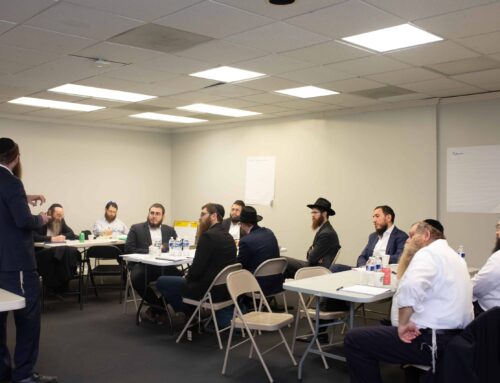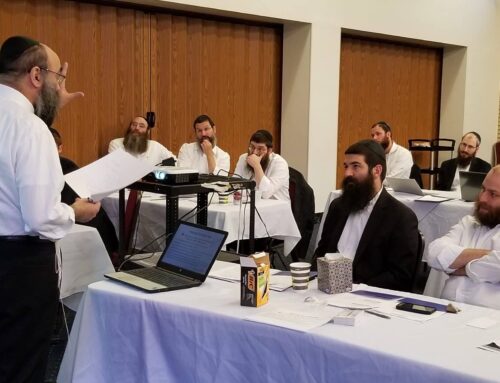
This November, the Menachem Education Foundation (MEF) hired Rabbi Shmuel Goldman to fill the positions of Executive Vice President and C.O.O.
MEF was founded in 2008 with the mission of raising the standard in Yeshiva education, working tirelessly since to train new teachers, create rigorous learning standards, develop school leadership, and more. After launching and establishing several successful programs and extending its impact to schools across the globe, MEF is ready to take the next step in expanding its team and solidifying its efforts.
Rabbi Zalman Shneur, founder and Executive Director at MEF, reached out to Rabbi Goldman, who has over twenty years of successful entrepreneurship and business management behind him.
In his previous career as co-founder and C.O.O. of Intrasphere Technologies, Inc., Rabbi Goldman built a technology based professional services firm into a Life-Science & Drug Safety focused organization with offices on three continents, servicing most global pharmaceutical companies.
Since negotiating a successful acquisition of his company in 2011, Rabbi Goldman was able to fulfill his life-long dream of dedicating himself to community based work full time, first consulting for Merkos L’Inyonei Chinuch, and then joining MEF as a full time member of its team.
Rabbi Goldman also co-founded and operates Chasdei Soul II Soul and serves as a board member for Crown Heights Young Entrepreneurs.
After a productive beginning at MEF’s Kingston Ave. offices, Rabbi Goldman sat down for a frank conversation about business, education, and changing the world.
1. What do you think the non-profit world has to learn from the private sector?
I have had a lot of experience running a fairly sophisticated organization in a number of areas – people management, financial management, customer service, technology… I don’t think those things are uniquely “for profit.” Any organization would benefit from processes that are well defined and developed. It’s a matter of the organization’s professional maturity.
Because our non-profits are low on funding and mission-focused, we can be resistant to spend money on overhead. Businesses can also have this reluctance, but for a not-for-profit it’s a much more difficult conflict. So one of the things nonprofits can learn from businesses is that investing in professionalizing its processes and infrastructure will benefit the organization’s mission in the long run, and is a necessary step in its growth and development.
2. And what can businesses learn from non-profits?
Always keep your eye on the mission. Always remember why it is that you’re doing what you’re doing.
In non-profits, the mission is so much more “in your face.” It’s at the forefront, every day, in everything that you do. In businesses, however, the mission could get lost. It would serve a business’s customers and themselves well to imbue this sense of mission in a real, tangible and vital way in their organization.
3. What motivates your dedication to community service?
I come from a family with a tradition of being involved in the community. My grandfather was the gabbai of 770, ran a free loan society, collected money for maamad and Ezras Torah, was a shochet…. As for my parents, they took over the G’mach from him, and my father was on the board of several of our community’s institutions. I grew up in a family that was very much imbued with a spirit of giving.
And, of course, growing up in Lubavitch, shlichus is the epitome of what we’re all striving for. What is shlichus if not community service? Our entire lives are based on how to improve the world!
4. What brought you to MEF in particular?
When Zalman called me, I had already heard of MEF by reading the various news items that were released about its Teacher Induction Program. What I saw was an organization that was already making a difference.
The fact that this organization was succeeding in getting teacher training to become part of the vernacular of our school systems and actively implemented it in a program spoke volumes about what MEF can accomplish. That intrigued me; the fact that a fairly young organization was able to partner with and encourage existing educational organizations to adopt change is impressive.
5. How do you think MEF will benefit from your experience as a successful entrepreneur?
I think I bring a very broad set of skills and experience to the table. I’m hoping to deploy all of those skills to improve the functioning and growth of MEF. Having run a professional service organization for so many years, I’m hoping to expand our professional services capability at MEF, to accelerate the rate with which we can spread the adoption of the best practices that we promote across multiple organizations.
Some schools are facing issues in various different areas, and with so much to deal with it could take years to change. If we could offer holistic services to partner with and support schools, we can help them improve their overall functioning both organizationally and educationally. We have seen some of the schools we worked with in this way flourish in a very short amount of time, and I would like to replicate this kind of success.
6. As a father and involved community member, what do you think our education system needs most today?
We need to remember that the crux of the issue “Chanoch lena’ar al pi darko (educate a child according to his way).” We’re educating the center mass and we’re losing all of the periphery. And I think the periphery is getting larger. We’re educating well a smaller number of students, and educating poorly a larger number. We need to find a way to enlarge that circle.
There are many different reasons for this; there isn’t one thing that’s causing these issues. The question facing us as a community is, what’s the best path forward to improving the education that our children receive?
I also see encouraging signs. The fact that schools are engaged with MEF is an amazing thing. My first day here, I went to an Inquiry session (one of the programs run by MEF) with teachers from five different Lubavitch schools, some of them veterans with twenty plus years of teaching experience, sitting in a classroom, learning new ways to teach and evaluate their students. That was tremendously encouraging to me.
7. What would your message be to young entrepreneurs who want to make a difference?
Everybody, in whichever situation they’re in, can find a way. If it’s important to you, you can find a way to change the world.
There is a major movement throughout the business world right now for philanthropy. Salesforce.com, Google, and other organizations now provide software to non-profits for free or at a subsidized rate. You can choose to give back to the community by doing what you do and offering your expertise, service, or product to the non-profit world, enabling them to benefit from things which would usually be cost-prohibitive.
Or, build a great business, make a lot of money, and give a lot of Tzedaka. There are many ways to do it – the key is just to help. You can change the world by doing your day job, too. It doesn’t have to be something that’s life altering.





